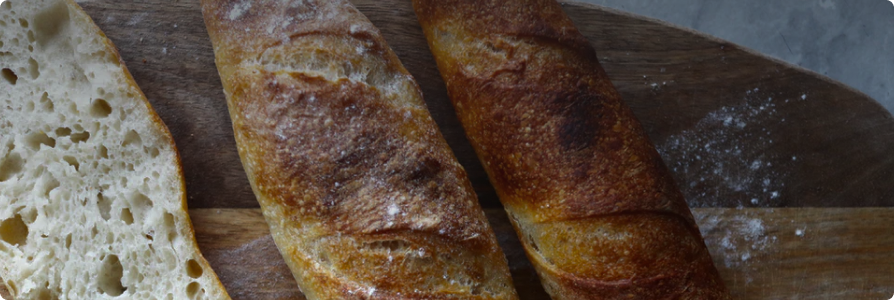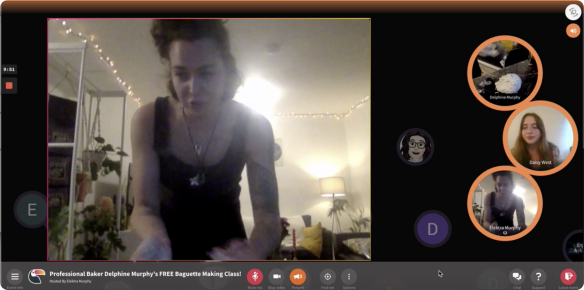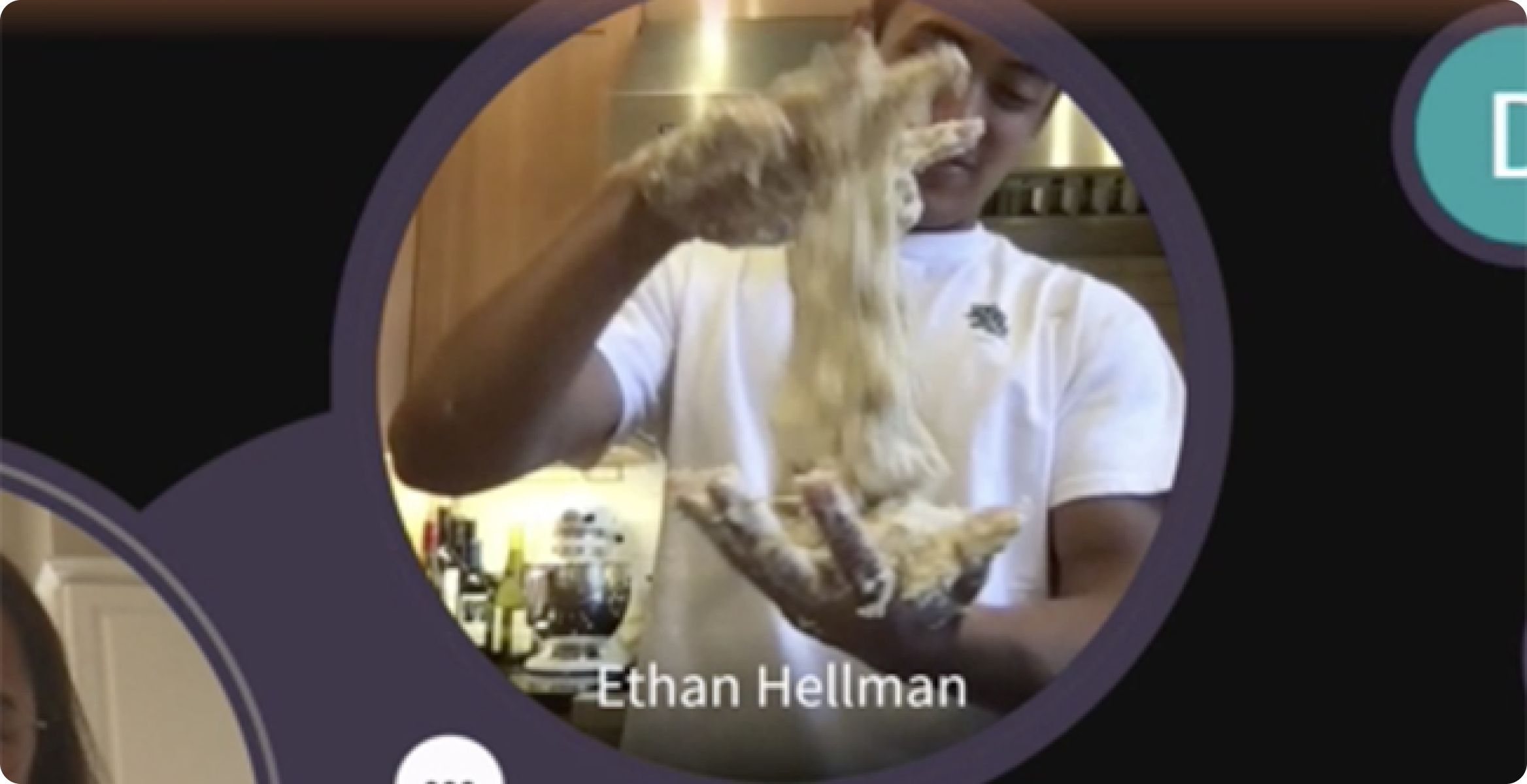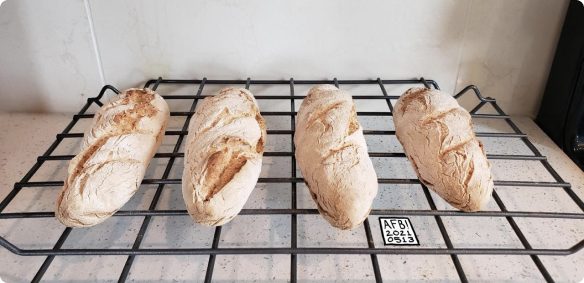Toucan's First Online Baking Class

Paul Murphy
2021.05.17
3 min read

Disclosure: the baker in question is my oldest daughter, so my reporting will be even more scrupulously accurate than usual. 😉
Baking? Online?
Every week Toucan hosts an online social for friends, family, ex-colleagues, investors, and the otherwise Toucan-curious. Normally these events are like a cocktail party. People show up, chat with each other, maybe have a drink or two – depending on their timezone – and “go home”. A few times our CEO has organized a Jeopardy game which I wrote about a long time ago.
This week we decided to try something completely different: a baking class.
We invited Delphine Murphy, a professional baker who’s baked and managed production at one of the top bakeries in the US, Easy Tiger, as well as at one of the top bakeries in the UK, The Little Bread Pedlar. She taught many bakers. This was her first time teaching a roomful of civilians. We learned to make French baguette.
If you’ve been following Toucan you know that we live all over the world, and that we don’t have a physical office, so naturally this class was online, and naturally we ran it on Toucan.
How it went
Starting with the punchline, it was a smashing success.
We got a few things wrong – it was our first online class after all – but Delphine rolled with the punches, and our audience was forgiving.
The week before the class we sent out the list of ingredients so everyone attending could be prepared.
Lesson #1: keep your audience’s environment in mind.
The list of ingredients was in grams because that’s how bakers work. It’s much easier to adjust ratios precisely using weights rather than volumes. But of course most of the North Americans attending the class didn’t have scales, so we needed to make some last minute conversions for them.
Once everyone showed up and was settled, Delphine got started. The first thing she had us make was a poolish. A what?! To a lot of us the word “poolish” sounded like a bug, or a disease. In fact, it’s just a starter that’s used in a lot of French baking. Easy enough to make. It’s not creepy, and it didn’t make anyone sick 😏
Lesson #2: don’t use jargon!
We’re all guilty of this. It’s easy to forget that “normal” people don’t use a weird French word to describe a mixture of flour, water, and yeast!
One of the coolest things about the class was the way it was set up. Delphine used two cameras, one pointed at her face, and one pointed at her hands. When someone’s giving a class or a lecture, we all want to see them of course, but if it’s a cooking demonstration, it’s even more important to see their hands.

Making bread is all about manual manipulation. From mixing, to kneading, to shaping, to scoring – another word I learned – it’s all about technique, and those techniques all require hand motions we don’t make in our everyday lives. Having a camera show us what Delphine was doing on her work surface turned out to be critical.
I mentioned “scoring”. Scoring means cutting the top of the dough so that it doesn’t explode in the oven when you bake it. “Explosion” may be an exaggeration, but Delphine made it clear that we shouldn’t forget to score our dough if we wanted the finished product to look like a baguette!
Baking, it turns out, is a rather physical, and sometimes violent, activity. Besides slicing to avoid explosions, we learned how to slam our dough against our work surface while kneading it with a force that would make a sports masseur blush. Most of us got more exercise during that class than we have during a whole year of lockdown. Bread bakers must be a fit bunch.
Lesson #3: emphasize what really matters.
I mentioned that we had two cameras. We broadcast the one of Delphine’s face in a bigger format than the one of her hands. This was a mistake. Her hands were more important than her face.
One of the great things about running a baking class on Toucan is that we all had the opportunity to chat with other students while we were working. When I got confused about how much water to put in the poolish, I just asked a friend. The way Toucan works I could do that without bothering the rest of the class, or interrupting the teacher.
The later part of the class got very social as people moved around showing each other how well (or badly in some cases 😬) their shaping had turned out. To people who were new to Toucan, this was a bit bewildering. We’re all used to Zoom lectures that don’t allow us to interact with other participants. Being able to hear a lecture and talk to your friends at the same time is a bit novel!

Lesson #4: teach people about Toucan before starting the class.
For those of us who are familiar with Toucan, this seems unnecessary, but it’s really not. In a way, this is just like the jargon lesson. Just because the platform’s dynamics are obvious to us doesn’t mean they’re obvious to everyone.
Let’s do it again!

Even though we had never put on a cooking class before, we got fantastic feedback from this event. A lot of people even requested that we invite Delphine back to teach us how to make something else. I think we will.
In the meantime, here’s the baguette recipe Delphine sent out after the class. It includes both weights and volumes for the ingredients, so should work almost anywhere in the world!
If you want to be kept up to date, and want to be sure to know about our next online baking class, sign up for our newsletter.
See Toucan in action without having to register
About author

Paul Murphy
Toucan co-founder.
Rabbi, driving instructor, and acrobat in parallel universes.
Go back to blog
© 2024 Toucan Events Inc. All rights reserved.
